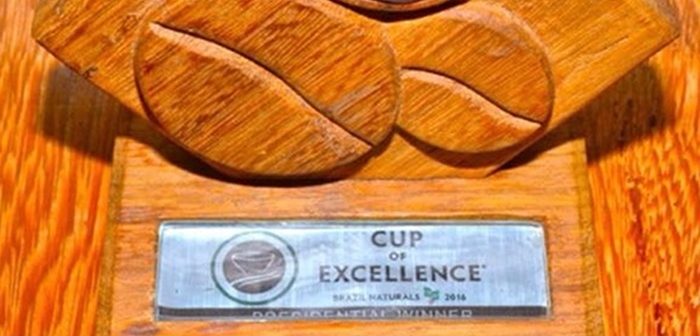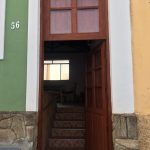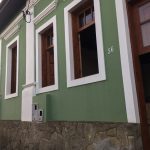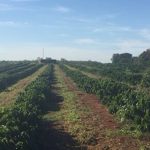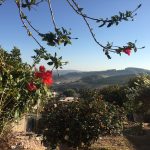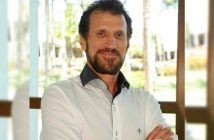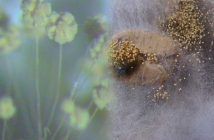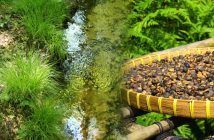In the last Cup of Excellence, five bags were acquired for R$ 18 thousand each, by Japanese company Maruyama.
Santo Antônio do Amparo is 185 km distant from Belo Horizonte and counts on around 18 thousand inhabitants. Like every small town in Brazil countryside, life there happens around the Mother Church square, where Santo Antônio de Pádua sanctuary is located, as well as retail shops. Close to it, 150 meters distant, the green house – seat of Guariroba farm in the city, where Paiva family receives visitors – is located.
Fully preserved, the building, with countless rooms, dates from the beginning of the last century. That’s where Gabriel Lamounier Vieira, his wife, Elisa Paiva Lamounier, his sister Marília Paiva and Renato Arriel, taster and barista, received Grão Especial team.
After a splendid lunch prepared by dear Toninha, the family handywoman, and after the first coffee fit for the gods, taken by Renato, we went to visit the farm.
Guariroba: Brazilian palm tree, with very bitter taste
Only 10 minutes distant from the house, Guariroba Farm is owned by Homero Aguiar Paiva, top executive at MRV construction company.
Gabriel, Elisa and Marília work more on the farm routine, though having other occupations as well. They are both dentists, Marília is a lawyer, while Renato is agronomist, playing an important role in plantations success. Together, the four brothers and the brother-in-law form the true DNA of Guariroba farm.
“Even though our father Afrânio Aguiar Paiva had worked with coffee his whole life, he always made a point that his children went to school, graduated and had other professions. He used to say that study is the only fortune he would leave to us and that would protect us from the ups and downs of coffee”, recalls Marília. And that’s how things occurred.
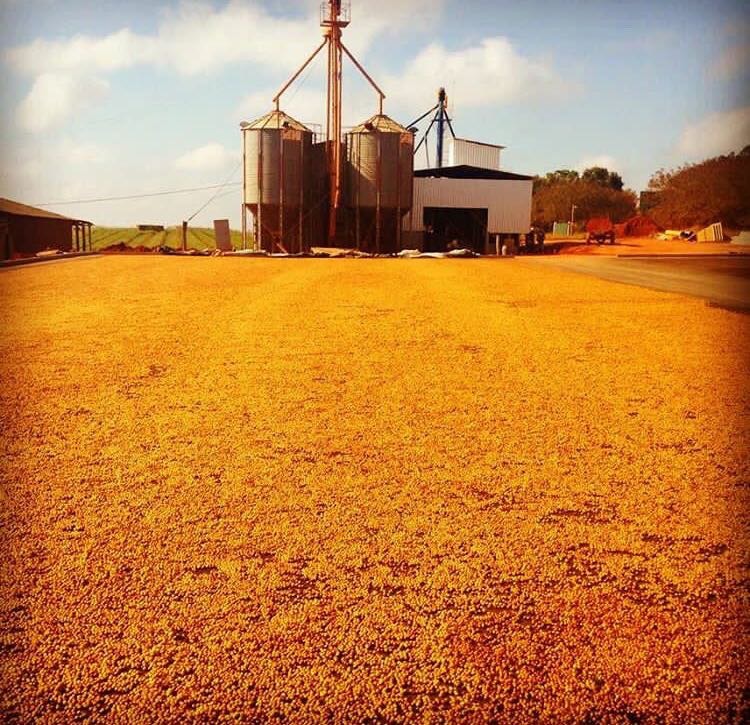
(The farm yard of Guariroba’s, full of fruits)
Guariroba farm counts on 200 hectares, 80 of them occupied with coffee and 50 of them with an irrigation system exclusively designed to meet the farm needs.
The special coffee production represents 40% of the coffee produced there. Species selected were Yellow Bourbon, Yellow Catucaí, Topázio and Catiguá.
The planting field winner of Cup of Excellence 2016 was the Yellow Catucaí, only five years old. Its mark was 90.5. The judges perceived nuances of honey, fennel, citric acid and yellow fruits.
At 1,100 meters altitude, the harvest is selective, and only ripe grains are collected. The method is natural and the coffee remains on the yard for seven days. “We mapped the plantations and determined the brix to measure the amount of sugar in the grain. This survey helps us understand the situation of each plantation”, she says.
(From the Mother Church of Santo Antônio de Amparo, passing through the headquarters house of Guariroba, until you reach the farm coffee plantations: places with incredible views!)
“Another unique care is dedicated to the harvest, which happens from May to September. This year we hired more women, because we know that they are more sensitive to this job. We are concerned with keeping the same women working year after year, because they already know how to correctly pick the cherries”, explains Gabriel.
“We see the importance of women in special coffee plantations. In the end of every harvest there is a party in the region, called Coelho (rabit). This year, we will promote the Coelho Rosa (Pink Rabit) party. We will bring manicurists and hairdressers to promote the Beauty Day. The party will end with the delivery of a certificate to award the quality of their work”, explains Marília.
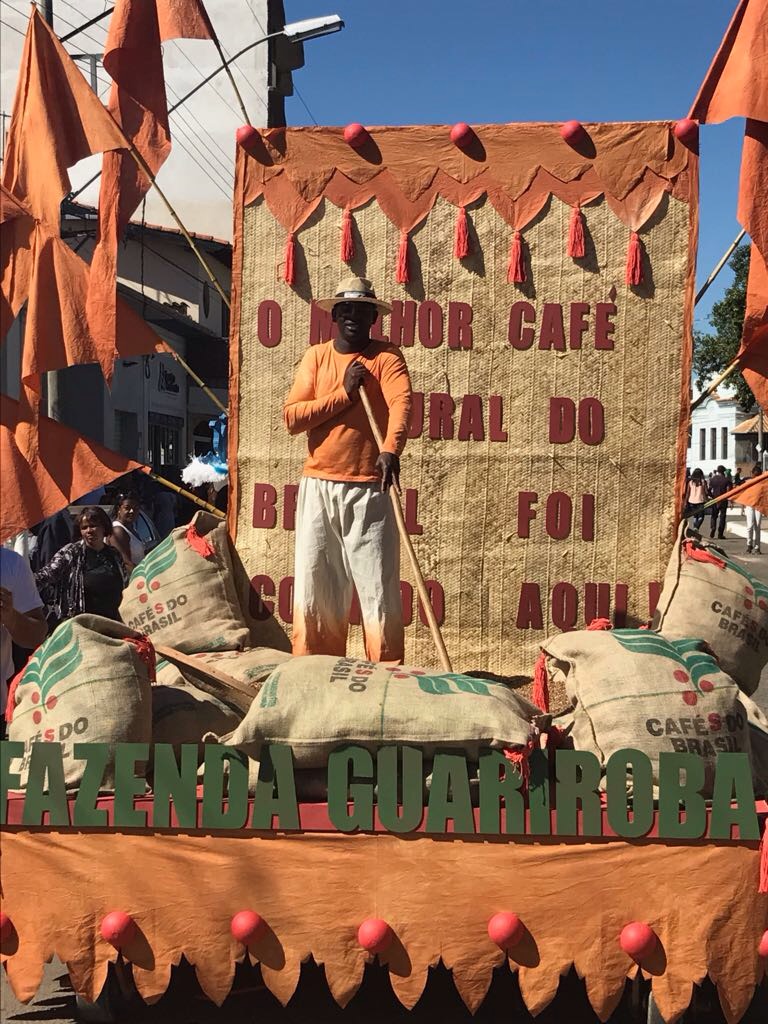
(Allegorical car in honor of Guariroba’s Farm, in the Festa do Coelho, at Santo Antônio do Amparo)
Coffee with soul
Throughout the year, Guariroba farm counts on 10 fixed employees, two in the office and the remaining in the plantations. During harvest, this number rises to 40. “Some of them who used to work for my father are still working in the yard. And he deceased 25 years ago”, recalls Vera.
As it could not be otherwise, Guariroba Farm coffees are all of them traced. They go to the yard on the same day of harvest, duly identified with the lot number, type of harvest, date of entry in the yard, date of entry in the dryer, in the processor, etc.
At the front of the farm’s administrative office there is a plantation field baptized with the name of the chief buyer of the farm coffees, Maruyama Coffees. By the way, they have been buying from the farm for three years. “He arrived here and said that there was an interesting variety, Catiguá. So we decided to pay homage to him, since each plantation here has a name, each of them with a meaning to us, paying homage to persons and dates that are important to the family.

(During the harvest season, the farm has about 40 employees)
High productivity
In 2016, 65 bags were harvested per hectare, in average. As comparison, the region average is 25 bags per hectare. “One of our differentials is the drip irrigation, and, of course, the plantations’ age, since a good portion is new. Guariroba has been planting special coffees for only seven years. And every year they make efforts to plant more 30 hectares.

(Coffee field in Guariroba’s Farm)
A little bit of history
Five generations working with coffee. The father, Afrânio Aguiar Paiva, owned some farms like Rubiácea and Mundo Novo. The uncle Fernando Paiva, on the other hand, 90 years old, was pioneer in planting superior quality coffees in Brazil and founded the Brazilian Association of Special Coffees, BSCA. Before Homero, he was the owner of the lands where Guariroba farms seats today, which belonged to Cachoeira farm.
“Practically, our coffee is totally exported, chiefly to Japan, China and the United States. The Starbucks Coffee, for example, acquired five bags in the last Cup of Excellence, paying the amount of R$ 16,399,85 for each bag”, explains Gabriel.
‘We have a clean energy project with UFLA ( Universidade Federal de Lavras). We intend to use solar energy in the whole farm. Our goal is to supply the whole energy needs of the farm and further advance the excellence project of Guariroba Farm” concludes Gabriel.

(Viewpoint from the coffee plantation of Guariroba, with the Farm appearing in the background)
Guariroba QGrader
Renato Arriel started working with coffee nine years ago, as tally clerk, administrative part of the harvest. He started to taste coffee and decided to specialize, attending to taste, barista, roast master courses, and finally QGrader. All of them at Academia do Café, in BH. “I worked there for some time and learnt a lot with Osnei, a master to me”, tells Renato.
